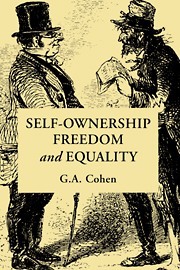Book contents
- Frontmatter
- Contents
- Preface
- Acknowledgements
- Introduction: history, ethics and Marxism
- 1 Robert Nozick and Wilt Chamberlain: how patterns preserve liberty
- 2 Justice, freedom, and market transactions
- 3 Self-ownership, world-ownership, and equality
- 4 Are freedom and equality compatible?
- 5 Self-ownership, communism, and equality: against the Marxist technological fix
- 6 Marxism and contemporary political philosophy, or: why Nozick exercises some Marxists more than he does any egalitarian liberals
- 7 Marx and Locke on land and labour
- 8 Exploitation in Marx: what makes it unjust?
- 9 Self-ownership: delineating the concept
- 10 Self-ownership: assessing the thesis
- 11 The future of a disillusion
- Bibliography
- Index of names
- Subject index
6 - Marxism and contemporary political philosophy, or: why Nozick exercises some Marxists more than he does any egalitarian liberals
Published online by Cambridge University Press: 29 August 2009
- Frontmatter
- Contents
- Preface
- Acknowledgements
- Introduction: history, ethics and Marxism
- 1 Robert Nozick and Wilt Chamberlain: how patterns preserve liberty
- 2 Justice, freedom, and market transactions
- 3 Self-ownership, world-ownership, and equality
- 4 Are freedom and equality compatible?
- 5 Self-ownership, communism, and equality: against the Marxist technological fix
- 6 Marxism and contemporary political philosophy, or: why Nozick exercises some Marxists more than he does any egalitarian liberals
- 7 Marx and Locke on land and labour
- 8 Exploitation in Marx: what makes it unjust?
- 9 Self-ownership: delineating the concept
- 10 Self-ownership: assessing the thesis
- 11 The future of a disillusion
- Bibliography
- Index of names
- Subject index
Summary
It is we who ploughed the prairies, built the cities where they trade, Dug the mines and built the workshops, endless miles of railroad laid; Now, we stand outcast and starving, mid the wonders we have made …
(Ralph Chaplin, ‘Solidarity Forever’)1. Although I belong to a school of thought which has been called analytical Marxism, I am, like other partisans of this position, and as is manifest in the preceding chapters of this book, engaged by questions in moral and political philosophy which have not, in the past, attracted the attention of Marxists. Analytical Marxists are concerned with exactly what a commitment to equality requires, and with exactly what sort of obligations productive and talented people have to people who are relatively unproductive, or handicapped, or in special need. We seek a precise definition of what exploitation is, and we want to know exactly why it is wrong.
What explains this rather novel involvement, novel, that is, for Marxists, or even – for it is no doubt, by now, more accurate to call us this – for semi-Marxists? I do not think that it is explained by the fact that, unlike the Marxists of yore, we are academics with relatively well paid jobs who get money and recognition through pursuing those questions and propounding our answers to them.
- Type
- Chapter
- Information
- Self-Ownership, Freedom, and Equality , pp. 144 - 164Publisher: Cambridge University PressPrint publication year: 1995

